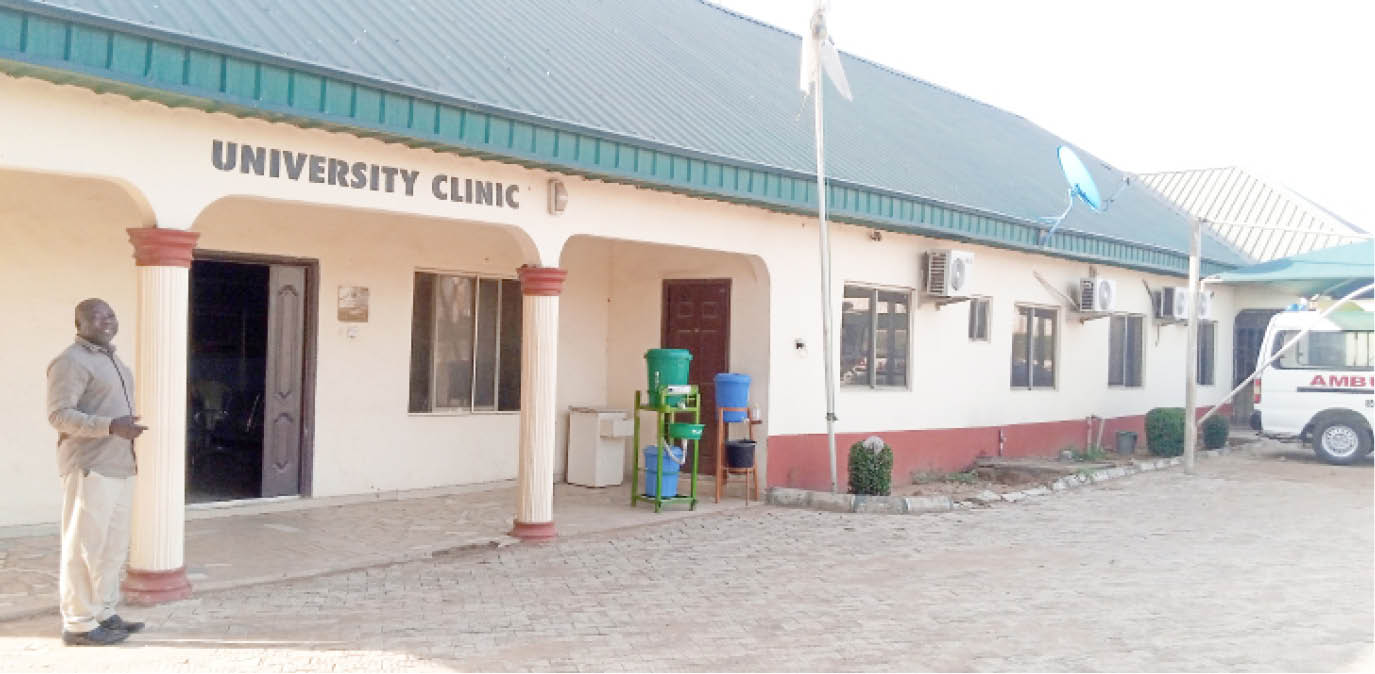Over time, some university students have lost their lives while seeking for medical attention at the clinics in their various institutions due to poor services or refusal to attend to them on time, an action that has generated protests and led to students boycotting the use of school clinics to seek for help outside the school environment. Daily Trust took a look at the condition of clinics in some universities and findings showed that not much is left to be desired.
“I had a terrible experience the day I was admitted at Jaja Clinic (University of Ibadan). That personal experience during my 100-Level days made me stop going to the clinic. When I got there, they didn’t attend to me until I vomited. After attending to me, the workers talked to us as if we came to beg for food.
- Creek road market, Hausa biggest yam market in Rivers
- 40 visually impaired pupils in Edo to undergo surgery
“They didn’t allow anyone to see me until evening. I couldn’t eat until I was discharged in the evening. They had to give me a prescription for drugs which I went to buy in town.”

The above was the experience of a 300-Level undergraduate of the University of Ibadan, who wouldn’t want her name in print. According to her, students and staff of the institution keep complaining bitterly about the services of the Jaja Clinic, despite the huge amount annually allocated to the running of the place.
She said her experience was better compared to what other students say about the clinic.
She recalled that students have protested against the state and services of Jaja Clinic many times, recalling that the last one was the 300-Level student who died during examination a few years ago.
“My simple advice for students is to go home when they discover they are not feeling fine.”
Another 300-Level law student described campus clinics not only at the University of Ibadan but in all government establishments as death traps.
“If the almighty Aso Rock clinic lack drugs and other necessities, what is Jaja Clinic then? The corruption in government has eaten deep into all sectors of our economy. The summary of my statement is: ‘forget the structures on the ground, we don’t have a clinic at the University of Ibadan’.” he said.
However, the University of Ibadan students are not the only ones in this situation. In 2018, students of the Nnamdi Azikiwe University, Awka, Anambra State, barricaded the school entrance roads and other parts of the community to protest the death of a final year student, Francis Chinedu Mmadubuobi, who they said died due to the negligence of staff at the university clinic.
Generally, Nigeria’s health care system has been adjudged to be weak, so it is not surprising that university clinics are weak as well.
Daily Trust findings after visiting some universities showed that most clinics are not performing to their full capacity. Some have bad structures; others are either short of clinical personnel, drugs, equipment or there’s generally poor attitude of personnel.
Wrong diagnosis rocks Ilorin
At the University of Ilorin, students expressed almost similar opinions regarding their school clinic.
According to a law student, one of the major issues that should be looked into is the issue of wrong diagnosis.
“There was a case recently where a student who was diagnosed of having malaria was later discovered to be suffering from kidney problem and some other ailments when he was taken to another hospital by his parents. The boy died last week because of what many attributed to improper tests conducted on him,” he said.
He also said that when he first visited the clinic, he was also diagnosed of having malaria and was given drugs. “But the situation worsened so I returned to the clinic and was admitted before I was treated properly.”
While noting that severe cases are transferred to the University of Ilorin Teaching Hospital (UITH), he condemned the act of not treating sick students without a clinic card, saying, “they won’t attend to him/her even if such a person is dying and presents his school ID card. I think that should be looked into.”
Another student said: “Most times, what they usually treat is just malaria and when you have the opportunity of going to another hospital, what you are treated for is different. There was one of my roommates who was even told to go and do a pregnancy test, which was not the case at the end of the day.”
Another female student told Daily Trust that although students are admitted in the clinic and some even given intravenous drip, the most common diagnosis and treatment is usually for malaria and cough.
“Although they provide drugs, at times you have to queue for several hours to see a doctor.”
Reacting to the complaints of the students, the Director Health University of Ilorin, Dr Abdulrasheed Odunola, denied the allegations.
“I don’t think the allegation of wrong diagnosis is true because as the director, I have been practising for about 35 years now, 11 of which has been spent here and I also consult. We have 10 other doctors here also, only one of them is a Youth Corps member apart from the over 15 that also joins us from UITH. You know how students can talk, but I don’t think it is true,” he said.
“And if something is not too clear, we have an MOU with UITH, if there is a need for specialist attention, we refer and use our ambulance to take the student to UITH at no cost to them.
“Most of the cases they present here are malaria and that is because about 70 per cent of any presentation in Nigeria now is due to malaria. But that does not mean or true that we only treat malaria. We do have cases of typhoid, asthma, sickle cell, cough and gastric issues.
Hand fans to the rescue in Maiduguri
At the University of Maiduguri clinic, however, it was observed that the clinic did not have light, coupled with poor ventilation systems. Students could not help but use their hand fans.
An Undergraduate student of Political Science, Hauwa, recalled her short but sad experience when she was hospitalized at the UNIMAID clinic.
She said: “They have adequate staff, but there was no light and drugs except Paracetamol. So, my coursemate smuggled me out of the clinic and took me to another hospital in the city.
“I spent about four hours there, but it was hell. My experience at the clinic was not a good one, they don’t have drugs. In fact, they should build a new clinic with adequate beds and staff,” she said.
For Ben Ahmed, the problem of the UniMaid clinic is that of light.
“I think the clinic was built when perhaps the population was less than 5,000 in the 80s and now, we have an exploding population in the university and the building does not have enough space and ventilation,” he said.
When contacted, the university’s Deputy Director Information, Tanko Ahmed, disputed the allegations but admitted that there are challenges and that the management has taken steps to upgrade the facility.
“As you are aware, the whole city has been out of electricity for more than three months. The management has ensured that light is sustained on the campus. The vice chancellor and his team are trying their best to address some of the key challenges,” he said.
While noting that the clinic is well furnished with drugs and other equipment, he said the management is currently constructing a new clinic to address some of the challenges.

Overstretched facility
At the Benue State University (BSU), students said the clinic has been overstretched and needs expansion to accommodate the ever growing population of the institution, this is even as the facility was renovated and expanded in July 2013.
When our reporter visited the clinic, there were staff on duty, an ambulance sighted in front of the clinic while some patients, mainly students, were being attended to by the health care givers.
A postgraduate student of the school, Attah Ede, said the clinic needs to be upgraded in all ramifications.
“The clinic does not have enough doctors and nurses. I will advise that it be relocated to the school of health sciences so it could be better managed by doctors in training,” he said.
He, however, said the clinic offers services, but not enough to accommodate many people, as it lacks basic equipment.
Another respondent in the institution, who simply gave his name as Emmanuel, corroborated the story, saying, “The capacity of the clinic is too small to accommodate the population of the school. I think they are working on a new one that will fit into the present reality.”
Reacting, the Head of BSU Information Unit, Tse Vanger, said the clinic works at its best and that the institution in an effort to further expand the facility has built a new edifice to serve as a clinic.
It’s all good but for the lack of drugs at BUK
At the Bayero University Kano, the three clinics serving the university community offer general services in dental, eye care, laboratory, x-ray, and pharmacy units.
According to students, the average waiting time for consultation is between 30 minutes and one hour.
It was gathered that the old campus’ clinic also served as a referral centre for cases from the new campus’ clinic and the cases that cannot be managed at the old site are further referred to the Aminu Kano Teaching Hospital.
Malam Mohammed Tasiu, one of the students who spoke to our correspondent at the new campus clinic, commended the staff of the clinic for always being responsive to students’ health concerns.
He said: “You must understand that it is natural to run short of some drugs sometimes in a clinic for the university community comprising of staff and students, and when that happens, what they do is to give you prescription to buy outside or wait until the clinic receives a new order.”
Another student Bright Danladi, said: “They are trying in the clinic because whenever you come here, there’s always a nurse that will attend to you and they are highly professional in the way they relate to patients whether students or members of staff.”
For Maimuna Aliyu, Umar Modu and Josiah Moses, the only problem they observed in the university clinics has been the paucity of drugs sometimes.
Reacting to this, the Director Medical Services of the university, Dr Mannir Sulaiman, said the university management has been doing its best to provide quality and free healthcare services to its students.
He said the occasional incidences reported by the students does not mean that the clinics were out of drugs, but such experiences only occur when the supply in the dispensing counters are exhausted before new supply is received from the central store.
“We value our students because they are the reason we are here; the university management is always doing its best to provide healthcare services free to students.”
Our correspondent observed that structures at both clinics were in good shape and there were nurses attending to patients at various sections of the clinics.
On the availability of medical doctors, Dr Sulaiman said at any point in time, three medical doctors are on ground to attend to patients at any of the university’s healthcare centres.
Harsh, rude personnel scare students at Abuja, Lagos
At the University of Abuja, a student who wants to be addressed as Dave said the clinic is in good condition and that when he visited, the only problem he noticed was that the personnel were very harsh and rude.
Another student who was at the clinic said it is well furnished, both exterior and interior, with air conditioning and constant light.
“They attend to us properly and the nurses are always on time for check-ups or administration of drugs, but only that the nurses can be harsh sometimes,” she said.
She said most times they were given drugs and the ones they don’t have, they ask them to buy outside.
At the University of Lagos (UNILAG), students complained of the impolite attitude of staff at the school clinic.
A student, Olamijuwon, described the attitude of personnel as “very rude”.
“They talk to you anyhow. They feel on top of the world, and they don’t attend to us fast. They are so insensitive that even if you have a bleeding hand, they will insist you go and get your card, without caring that you are losing blood. They have enough facilities, but basically, they are inhuman.”
The student further disclosed that the ambulances at the clinic are not responsive the way they should; saying, they do not respond fast as expected. “In the area of staffing, I feel all hospitals in Nigeria are under-staffed, so government needs to recruit more personnel and organize training for them from time to time,”
On his own part, a Law student, Williams Kenny Oladipupo, said that in relation to other universities clinics in Nigeria, UNILAG has one of the best.
He said: “A friend of mine was admitted at the clinic in 2018, they not only provided for his feeding, they also gave him free medications. The doctors checked up on him regularly.
“However, the ambulance response time is not as fast as it should be, something needs to be done in that regard to meet up with emergencies. The staff also need to be more polite,” he added.
For Adekunle Adedigbe, the clinic is not that bad. “I have been there, some of the nurses are not the friendliest but the doctors are very nice. The government should increase the quality of the clinic and run training programs for the nurses because they are rude,” he alleged.
Another student, Miss Vanessa, said she didn’t do her medical registration because of the bad manners of the clinic staff. “The clinic is very bad; if you go there to complain, you will stand in the queue sometimes from morning till evening, even when there is an emergency. The staff are very rude which is why up till now, I haven’t gone to do my medical registration and I can’t graduate without it.
She said: “Their services are very poor which is why I can’t go there. I have been purging for some days now, but I didn’t even bother to go to the clinic because it will be of no use,” she said.
One of the staff of the clinic who spoke to our reporter said they have been working perfectly well without much challenge.
“Since the COVID-19 pandemic, we have been mindful of the way we operate as students were asked to leave campus except those writing exams and we even had to conduct online examinations.”
People that need medical attention were not asked to come into the clinic. We are doing this in case we find anyone with COVID-19, so we can refer them to the appropriate centre for immediate treatment.”
Timely treatment at Jos
At the University of Jos, Plateau State, our correspondent who visited the clinic observed that the place was full of activities as students who needed medical attention were seen going in and out, while others were seated and waiting for nurses or doctor’s attention.
A 400-level student of mass communication, Jude Dangwam, said the clinic, to his understanding, has been meeting students’ health needs.
According to him, even though he doesn’t visit the clinic frequently, he is impressed with the way and manner the personnel carried out their duty.
He said the last time he visited the clinic was during the recent registration where students are usually required to go for medical examination like x-ray, blood group among others, and that there are good attendance and facilities in the clinic.
Another student of Estate management, Rachel Bulus, said most students in the hostel have been patronizing the clinic because they get timely treatment and get admitted when necessary.
She, however, said the facilities can be improved upon so that students who go outside for medical treatment would desist and use the school clinic, considering the fact that they pay medical fee when paying school fees every session.
Chidimma C. Okeke (Abuja), Jeremiah Oke (Ibadan), Mumini AbdulKareem (Ilorin), Hope Abah Emmanuel (Makurdi), Richard P. Ngbokai (Kano), Christiana T. Alabi & Precious Momodu (Lagos), Dickson S. Adama (Jos) & Olatunji Omirin (Maiduguri)

 Join Daily Trust WhatsApp Community For Quick Access To News and Happenings Around You.
Join Daily Trust WhatsApp Community For Quick Access To News and Happenings Around You.


